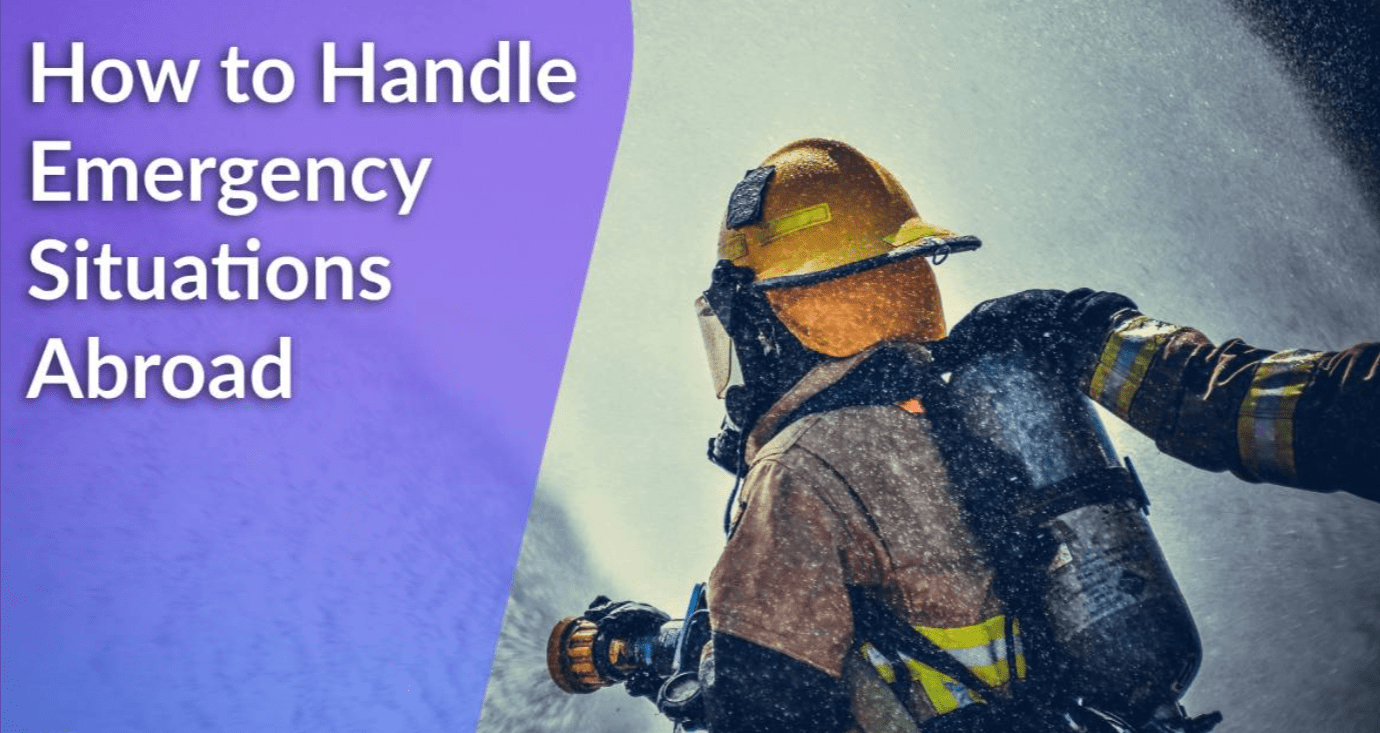How to Manage Emergency Situations While Living Abroad

But moving new countries offers that excitement and a new life transforming experience. However, deciphering the challenge of emergencies while being away from home is one important skill. Disasters can happen at the world's farthest corner at any time in human history, whether sudden or gradual. The difference in preparedness and knowing how you'll react is quite important.
In this article, we’ll show you what you need to be how to address emergency situations when living abroad, whether you’re dealing with a health emergency or a natural disaster, and help to give you greater confidence and security in any situation.
Describing the Need for Emergency Preparedness
When you are out of America, you're under foreign soil with potentially foreign material values and procedures or just different expectations in emergencies. Every prep for any emergency begins with the simple acknowledgment that emergencies are bloody by definition unpredictable and that being proactive is the best response. Knowing you are doing things to keep you secure in stressful times decreases stress during these times.
Common Types of Emergencies You Could Face Abroad
More on emergencies you may encounter while living abroad. Here are a few common scenarios:
1. Health Emergencies
The unexpected will happen, especially when you live in a country where you may not speak the language. And health emergencies from all minor injuries up to serious conditions need immediate attention. Knowing where the nearest hospital or clinic is located is important.
2. Natural Disasters
Certain parts of the world are more vulnerable to natural calamities such as earthquakes, tsunamis, hurricanes, floods, volcanic activity, etc. Knowing a lot about the local climate and geography will go a great deal in preparing for maximum incidence.
3. Civil Disturbance or Political Unrest
Political unrest can result in demonstrators, labor walkouts, or worse. It is essential to know how to keep abreast of the political situation and how to respond in such scenarios.
4. Important Documents Lost or Stolen
This can cause a big disruption, especially if your passport, wallet or credit cards are lost or stolen. But knowing the procedures of local police for reporting the loss and getting replacements is vital.
How to Deal with Emergencies while Traveling - A Step by Step Guide
The first and most important thing to do in the event of an emergency abroad is to remain calm. Here’s how to handle these situations in a good way:
Step 1: Remain Calm and Evaluate The Situation
The most important thing to remember during any emergency is to take a deep breath. Panic has the power to cloud the mind and worsen the situation. Evaluate how serious the situation is and what needs to be done most urgently.
Step 2: Know the Local Emergency Services and Numbers
As you know the emergency numbers for police, ambulance and fire differ from country to country. Learn these numbers as soon as you arrive in the country. Depending on the type of crisis, some countries may even have other specialized emergency services.
Step 3: Work with Your Embassy or Consulate
For serious emergencies, it’s critical to get in touch with your country’s embassy or consulate. They can provide guidance, assist with legal issues, facilitate medical referrals and even evacuations if necessary.
Step 4: Save Contact info for People You May Call
Keep a list of important contacts such as local emergency numbers, the nearest hospital, your country’s embassy and trusted friends or family members. Consequently, keeping these details at your fingertips will save you time when you need it.
Step 5: Have Important Documents Ready
Having copies of your vital documents (passport, ID, health insurance, etc.) can save your life in case of theft or natural calamities. Keep these documents for your records, ideally both in physical and electronic formats.
Medical and Health Emergencies
Health emergencies can strike at any moment. Here are the steps that you should follow when dealing with health-related emergencies while traveling abroad:
How to Seek Medical Help Quickly
Healthcare services in many countries can be very different from what you’re used to. While some countries may have the most sophisticated of systems, others may be without even the simple foundations of health care. Explore your local healthcare options before an emergency strikes. Know where to find the nearest hospital or clinic, and have a list of local doctors and pharmacies on hand.
What To Do If You Need Emergency Medical Attention
If you experience a health emergency, contact the local emergency telephone number and report your information clearly. If there’s a language barrier, you might want to download a translator app or have a local guide available. You must bring your health insurance card and identification with you if you require a hospital.
Travel Insurance: Here’s why you need it
Any medical emergency while travelling on foreign soil and travel insurance comes to the rescue. A good travel insurance policy will cover the cost of your medical expenses, evacuations, and even trip cancellations. It’s one of the essential things you have while living abroad.
What to Do During Natural Disasters
If you live in a natural disaster area, you must be prepared. The following are tips for how to deal with common natural disasters:
1. Earthquakes
In earthquake-affected areas, prepare an evacuation route. Research the safest areas to take cover (that is, under the solid table or door frame) in case of an earthquake and do all you can do to meet "earthquake-proofing".
2. Hurricanes and Typhoons
Get to know the weather alerts and evacuation routes if you reside within a hurricane- or typhoon-prone area. Just get water, food, batteries, and a first-aid kit in sufficient quantities to see you through about a week.
3. Floods
Floods can develop quickly, and the same is true during the rainy seasons. Know the flood zones and how you would evacuate quickly if needed. Store your valuables in elevated areas to protect them from flooding.
Working With Political Instability or Civil Unrest
Living abroad in a politically unstable region can pose a risk, but if you stay aware and are prepared, you can remain safe:
1. Recognizing Warning Signs
Stay informed via local news, the social media and travel advisories. Political unrest is common but it can be predictably preventable before its violence. It can be vital to know when to stay at home or steer clear of parts of town.
2. What to Do If Conflict Erupts in Your New Country
In case of political unrest or protest, stay indoors, keep away from protest sites and keep updated through news channels or official advisories. Always plan an escape route if things turn sour.
How to Handle Theft, Lost Items, or Accidents
Misplaced items are not new to anyone living abroad. Here’s what you should do:
What You Should Do if Your Passport Is Lost
If you lose your passport or have it stolen, report the incident as soon as possible to local police. Then reach out to your embassy to apply for an emergency travel document.
Handling Theft or Lost personal belongings
If your wallet or phone is stolen, file a report with local authorities and lock or cancel any accounts or cards that have been compromised. Reach out to your embassy for help replacing your lost documents.
Building an Emergency Kit
Having an emergency kit is always wise. Some of the things you should include are:
- First aid supplies
- Torch with spare batteries or bulbs
- Water and non-perishable food
- Portable phone charger
- Essential documents (in a waterproof pouch)
Basic Safety Precautions for Travel Abroad
- Stay abreast of the local situation by following the news and government advisories.
- Speak the native tongue or at least, some relevant words, so as to make yourself understood in case of an emergency.
- In thing that don’t have to ask, kindly trust your instinct that if it doesn’t feel right you should get out of the situation.
Conclusion: Stay Alert, Exercise Caution
Living overseas can be one of the best adventures of your life, but you need to always be ready for a potential emergency. Right | As long as you remain calm, are aware of what to do, and have all of the necessary resources at your disposal, you will be able to get through whatever is thrown at you. Always keep the safety and health of you and others first and prepare to manage emergencies efficiently.
Just keep in mind that emergencies do not follow a schedule, but having your response ready to go in no time can change what happens in the outcome.
